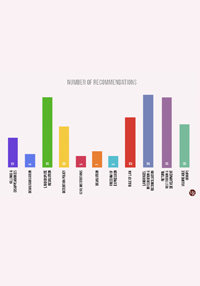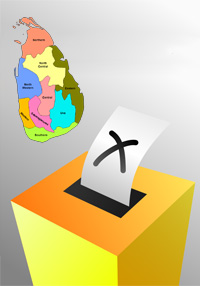Sri Lanka: LLRC Implementation Monitor – Statistical and Analytical Review No. 1 is the first report in a series of research and informational documents intended to assist in efforts to implement the LLRC recommendations. The report contains an analytical counting and categorisation of the LLRC recommendations, and an analytical assessment of the National Plan of Action to Implement the Recommendations of the LLRC. The report specifically examines the overlap and differences between the recommendations of the LLRC and the actions envisaged by the National Plan of Action.
This briefing note is Verité Research’s latest study on the Sri Lankan government’s commitments on reconciliation and accountability. It assesses progress in the fulfillment of 36 commitments made in UNHRC Resolution 30/1, co-sponsored by Sri Lanka in September 2015.
This report features a comprehensive analysis of the recently concluded Provincial Council elections, detailing the performance of major political parties, voting trends, and the emerging political landscape in post-war Sri Lanka. The voting environment, political campaigns and the various electoral politics preceding the election are also scrutinized to ascertain the level of transparency and accountability of the electoral system. The report includes data on previous elections to determine the evolution in socio-economic preferences related to voting patterns and also highlights the evolution of political preferences using a variety of visual data tools.
This report provides a detailed analysis of the main reasons attributed to the power crisis prevailing in Sri Lanka during a greater part of the year. It identifies how these reasons; namely, the unexpected high growth in demand, shortage in generation capacity, reduced rainfall in catchment areas and the breakdown of the Chinese-built coal power station, cannot fully explain the crisis. The report also classifies a policy decision which has been implemented to reduce costs but may have been utilized rather aggressively, resulting to have contributed to the power crisis.
The EPF’s management of equity investments are seriously at odds with its mission. It has hugely underperformed the All Share Price Index (ASPI), and earned only one fourth of what it would have earned if the same investment had been placed with the usual no-risk-low-return government securities, where 95% of the EPF funds are placed. Additionally, in 2010, the Employee’s Trust Fund’s (ETF) investments in equity performed 6 times better than the EPF’s investments in equity.
The report summarises Sri Lanka’s macroeconomic environment, analysing the 2012 budget and providing a comparative study of government expenditure. It finds that the focus of government expenditure has shifted from funding welfare activities to funding infrastructure projects. It also considers the amount of government budget allocated under the executive presidency, inconsistencies in taxation policy and a summary of government expenditure and revenue.
The World Bank’s ‘Doing Business Index’ measures the ease with which domestic small and medium sized enterprises to do business. Between 2011 and 2012, Sri Lanka’s rank in the Doing Business Index rose by 9 places, from 98th to 89th. However, an analysis of Sri Lanka’s rise indicates that it was mainly attributed to a jump in the strengthening investor protection category, and that the country’s rank declined or performed poorly in the remaining 9 indicators.





